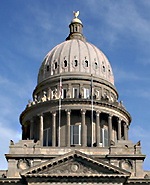
|
CONNECTIONS
|
IDAHO
ITD
HOME
IDAHO DMV
ITD
NEWS
HIGHWAY
SAFETY
IDAHO STATE
POLICE
TRAVEL SERVICES
STATE OF IDAHO
NATIONAL
AASHTO
AAMVA
AAA of IDAHO
FEDERAL HIGHWAYS
FEDERAL AVIATION
IDAHO STATE POLICE
NHTSA
NTSB
TRB
U.S. DOT
Idaho
Transportation
Department
Public Affairs Office
P.O. Box 7129
Boise, ID 83707
208.334.8005
Fax: 208.334.8563
Email

Governor proposes 5 percent CEC merit increase; takes transportation
in positive direction
 Gov.
C.L. “Butch” Otter unveiled his roadmap for the 2007 Legislative
session Monday when he presented his first combined “State-of-the-State”
and budget address. His far-reaching plan touched on change in employee
compensation (CEC) for state employees and recommendations for transportation
spending.
Gov.
C.L. “Butch” Otter unveiled his roadmap for the 2007 Legislative
session Monday when he presented his first combined “State-of-the-State”
and budget address. His far-reaching plan touched on change in employee
compensation (CEC) for state employees and recommendations for transportation
spending.
“We are encouraged by the governor’s emphasis on fiscal stewardship in state agencies and his practical approach to spending and programs,” said Pam Lowe, who becomes director of the Idaho Transportation Department Tuesday (Jan. 16). “We look forward to working with Governor Otter and his staff on transportation-related matters.”
“Because of the transition to a new governor and administration we did not have the benefit of his input in preparation of our budget or legislative requests,” Lowe said. “As we develop a strong working relationship with the governor and his staff, we will have a better understanding of his priorities and vision.”
|
'Health
insurance costs are increasing, both for the department and for
employees, but we don’t know what to expect because the
state is negotiating a new contract for health insurance coverage.
We will keep employees informed of the progress.' – ITD Director Pam Lowe |
In his address Monday, Gov. Otter acknowledged the contributions of state employees and affirmed the need to provide “the kind of competitive salaries needed to keep our most skilled public servants, or to attract the most qualified people to fill the vacancies when they leave.”
To address salary needs, he asked legislators to fully fund a 5 percent, merit-based CEC increase.
“This is an important step toward making our state salaries more competitive. We need a more market-driven compensation package for our state employees, and I look forward to working with chairmen (Robert E.) Schafer (House) and (John C.) Andreason (Senate) to get it done.”
The governor’s CEC recommendation is slightly higher than the transportation department’s initial salary request. It serves as a beginning point for legislators as they shape the FY08 budget package.
Gov. Otter’s budget plan did not address the second part of ITD’s two-year plan to improve compensation for targeted positions where recruiting and retention have become critical. ITD continues to experience a drain of highly qualified and trained employees to the private sector and other public agencies.
The governor also did not address escalating state employee benefits, specifically costs of providing health insurance.
“Health insurance costs are increasing, both for the department and for employees,” Lowe said, “but we don’t know what to expect because the state is negotiating a new contract for health insurance coverage. We will keep employees informed of the progress.”
The new director was especially encouraged by Gov. Otter’s support for the GARVEE-funded Connecting Idaho program. He asked legislators to approve the transportation board’s request to issue $264 million in GARVEE (Grant Anticipation Revenue Vehicle) bonds for the second year of the construction program.
'He
supported the plan adopted by the board for FY08, and advocated
leaving decision-making in the hands of transportation officials.
That speaks very positively about the board and our professional
staff.' – ITD Director Pam Lowe |
“…These bonds will be paid off with the continuing appropriation of federal highway funds that are allocated to the state,” the governor explained.
“However, I am making no recommendations on which routes should be included in the GARVEE program. And I strongly urge you not to identify the transportation priorities, either. That is a job for professionals – not politicians. Given the enormous needs and our scarce resources, we can hardly afford our own ‘bridges to nowhere.’ ”
“That is very positive,” Lowe said. “He supported the plan adopted by the board for FY08, and advocated leaving decision-making in the hands of transportation officials. That speaks very positively about the board and our professional staff.”
The governor, however, deferred support of the transportation board’s plan to generate additional revenue for construction projects. The board based its revenue proposal on an extensive, non-partisan statewide process completed in late 2005 – The Forum on Transportation Investment.
“You also will see legislation to address the transportation department’s revenue needs,” the governor told legislators Monday. “However, I do not recommend acting on those needs until the department has shown that it is operating efficiently, using the best practices available today, and actively engaging industry in its efforts.”
Lowe considered the governor’s remarks both constructive and encouraging.
“The transportation department, over the years, has proven to be a good steward of state and federal resources. We will continue to look for ways to operate more efficiently and invest our taxpayer dollars in areas where they are best utilized,” Lowe said.
“We also will continue to develop strong partnerships with the private sector to accomplish even more with the resources available. Several ongoing efforts – such as the new Oasis rest area in District 5, DMV Modernization and Information Technology – have benefited from such collaborative approaches. We look forward to building additional partnerships such as these in the future.”
See full text of Gov. Otter’s State of the State/Budget address
Published 1-12-07